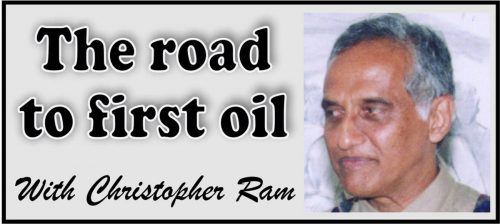“You couldn’t do the math”, said Ambassador Perry Holloway in his interview with reporters published in Stabroek News last Tuesday December 9, 2018 as he exhorted us Guyanese to educate ourselves about the fortune coming our way from ExxonMobil’s oil. Let us allow the man the slack to exult that it was under his watch that a giant American company discovered some of the largest oil finds in the past ten years; that the 2016 Petroleum Agreement signed by the APNU+ AFC gave to the Americans in Guyana’s Maritime Zone an even better version of China’s Belt and Road Plan without even one Dollar or Yuan given by the US Government in loan or grant to the people of Guyana.
But we need to draw the line when exultation turns to condescension and Guyanese are told they cannot count, or as the departed Ambassador said, “do the math.” Well, I have news for the Ambassador: it is he who cannot count and who appears to be uninformed about the terms of the 2016 Agreement.
It is more than a joke that English was too hard and so the Americans created American “English”. Now it seems their math is poor as well, even as their Ambassador criticises us. But we should not be too hard on the poor man as he is no different from the rest of his countrymen and women: America is not among the top twenty-five countries in the world in math and science.
Free-talking
Holloway has for a long time been making all kinds of exaggerated claims about the impact of oil and how Guyanese will soon become the richest people in the world. I was there at a function at the Duke Lodge earlier this year when he repeated the extravagant claim which I challenged. Guyanese should beware of such banalities. Unfortunately, an editorial in the following day’s Stabroek News was almost hagiographical of Holloway, while senior Government Minister Carl Greenidge is reported to have expressed gratitude to him. So let us get back to the Ambassador and his math.
Here is what he is reported to have said:
“This is a monstrous amount of oil and a large amount of money. You couldn’t do the math. Let’s just take a small number and say in 2025 you are producing 500,000 barrels a day, which is on the low end of the estimate. Assume it is worth US$50 a barrel—low estimate. You multiply that number of barrels and Guyana will get all the infrastructure costs paid by 2025. So Guyana will get more than half of that based on the contract. Do the math, it is a lot of money. It is a lot… about three hundred percent greater than what Guyana produces in a year now.”
How does Holloway know what the Government’s revenue to 2025 is when our own Finance Minister admits in paragraph 4.8 of his 2019 Budget Speech to not making any projections for oil revenues in 2020 – 2022? Sadly, this is the same kind of nonsense which Holloway has been peddling since Exxon’s announcement in 2015. Had the Ambassador read the 2016 Agreement or been following the local media, parts of which he chose to label as doom and gloom, he would have known that Exxon & Co are allowed to recover their gross pre-contract cost and their pre-production cost that will come in at around half a trillion Guyana Dollars before the first barrel of oil is pumped.
Minor details
Holloway exposes his hollow understanding of the contract by referring to Guyana getting “more than half of that (US$50 a barrel) based on the contract”, blissfully unconcerned about minor details such as recoverable production costs which will amount around 35% to 50% of revenue, and non-ring-fenced cost. It is only if recoverable cost in any year is less than seventy-five percent of revenue that Guyana receives 50% of the surplus, referred to as profit oil. The Ambassador also overlooks the point that the Agreement requires the Government of Guyana to pay any tax on its profit to which Exxon may become liable.
The Ambassador also loosely refers to petroleum bringing in “about three hundred percent greater than what Guyana produces in a year now”, which is equally unfathomable. Does he mean which Guyana produces in gold, rice, sugar, timber and other products? And are we to believe that we should consider and compare Government revenue from a single offshore product with the economics of an entire on-shore, labour intensive sector of the economy?
The Ambassador was obviously doing his job as a representative of the US Government. And as gracious hosts he should be allowed all the courtesies and be accorded the hospitality for which Guyana is famous. But there is a limit. We can do math and we are not gullible. Please Sir, do not treat us as if we are.









